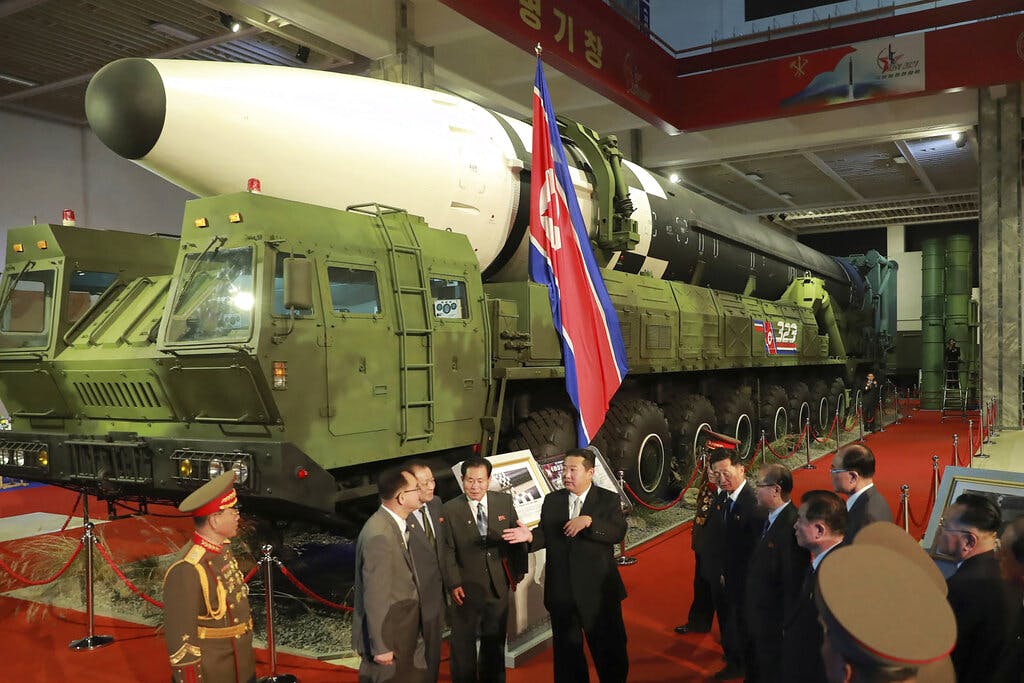North Korean Reds Chairing UN Disarmament Conference While Testing Missiles
Biden resists a serious boycott of the conference, hoping to reform the UN from within.

At a United Nations Security Council meeting last week, the American ambassador to the UN, Linda Thomas-Greenfield, called North Korea’s six intercontinental ballistic missile launches in 2022 “a threat to the peace and security of the entire international community.” Yet this week the Kim Jong-un regime took over the presidency of the United Nations Conference on Disarmament. Put simply, the fox is guarding the hen house.
The Biden administration noted in January that the CD had “made fundamental contributions to international peace and security” but has been “gridlocked and stymied” for the last 20 years. The conference has been deadlocked following the negotiation of the Comprehensive Test Ban Treaty in 1996, which was rejected by the U.S. Senate in 1999.
While Pyongyang’s accession to the conference presidency will have little impact on nonproliferation negotiations, it highlights a pervasive problem at the United Nations: Authoritarian regimes are co-opting the rules-based international system.
North Korea’s stint leading the CD reflects an arbitrary method of selection: Each CD member state serves a four-week term in rotating alphabetical order. Thus, the Democratic People’s Republic of Korea — North Korea’s formal name — succeeded Cuba and will pass the presidency to the Democratic Republic of the Congo.
Pyongyang’s record of illicit nuclear proliferation is hard to match. First and foremost, it flagrantly violated the Treaty on the Non-Proliferation of Nuclear Weapons, known as the NPT, by manufacturing nuclear weapons.
The regime also undermined its safeguards agreement with the International Atomic Energy Agency. The Kim regime announced its withdrawal from the NPT in 2003 after new international scrutiny of North Korea’s nuclear weapons program, including its covert uranium enrichment program.
North Korea likewise breached two additional agreements that prohibit the development of biological and chemical weapons. The United States assesses that Pyongyang has an offensive biological weapons program “intended for use to counter U.S. and ROK military superiority.” In 2017, the Kim regime used VX, a deadly nerve agent, in a Malaysian airport to assassinate Kim Jong-nam, Kim Jong-un’s half-brother.
Han Tae-song, the disarmament conference’s ’s new president and North Korea’s ambassador to the UN offices in Geneva, even has a record of threatening the United States. In 2017, during a time of heightened tensions following Pyongyang’s sixth nuclear test, Mr. Han warned that the U.S. would suffer the “greatest pain” because it pressed the Security Council to impose sanctions on North Korea.
The conference’s stated priority is the “cessation of the nuclear arms race and nuclear disarmament” and the “prevention of nuclear war.” To put it mildly, Pyongyang is not committed to nuclear disarmament, and its expanding nuclear program is fueling the global nuclear arms race that has also brought Iran to the threshold of nuclear weapons.
Kim Jong-un used a late April military parade marking the 90th anniversary of the North Korean army to explain his nuclear weapons doctrine. While he reiterated that his weapons deter Pyongyang’s perceived enemies, he also issued a veiled threat that the nukes would have a “secondary mission.”
Mr. Kim likely meant he would threaten to use nuclear weapons to coerce South Korea into concessions that lead to Pyongyang’s ultimate goal of a unified Korean peninsula under the Kim family’s rule.
The Biden administration will likely organize a symbolic diplomatic boycott of the CD during North Korea’s presidency. But the administration will return to the organization because President Biden believes that Washington stands a better chance of reforming UN organizations from within than from without.
So far, Mr. Biden has nothing to show for such efforts thanks to the robust influence of autocrats not only at the CD but in the broader UN system. After all, Ms. Thomas-Greenfield’s remarks last week preceded China and Russia’s Security Council veto of the Biden administration’s sanctions resolution against North Korea.
Moscow and Beijing will probably continue to use their veto powers to shield their allies from accountability. This reality, compounded by North Korea’s leadership of the CD, suggests that Pyongyang will continue to face no meaningful UN opposition to its missile tests.
